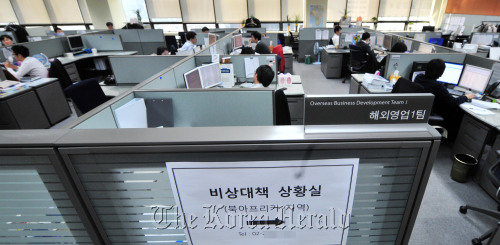Growing unrest in the Middle East and soaring crude oil prices are casting clouds over the Korean economy and placing the government and businesses on emergency footing.
Construction and airline firms led a plunge in stocks in Seoul on Tuesday on concerns that protracted protests in Libya and the region could deal a major blow to Korean businesses there and Brent prices approached $107 in Asian trade.
The KOSPI ended down 1.76 percent or 35.38 points at 1,969.92 points.
The local currency ended at 1,127.60 won to the dollar, down 9.5 won from Monday’s close, as geopolitical risks revived investors’ appetite for safe assets, dealers said.
Major Korean builders put their construction projects in Libya on hold amid a bloody revolt against authoritarian rule by its leader Muammar Gaddafi.
Last year alone, Korea won nine contracts worth $2 billion in Libya, making it one of the biggest foreign players outside of the oil market which produces most of the country’s wealth.
A total of 24 Korean builders are working in Libya, hiring 22,000 employees including 1,300 Koreans.
Construction and airline firms led a plunge in stocks in Seoul on Tuesday on concerns that protracted protests in Libya and the region could deal a major blow to Korean businesses there and Brent prices approached $107 in Asian trade.
The KOSPI ended down 1.76 percent or 35.38 points at 1,969.92 points.
The local currency ended at 1,127.60 won to the dollar, down 9.5 won from Monday’s close, as geopolitical risks revived investors’ appetite for safe assets, dealers said.
Major Korean builders put their construction projects in Libya on hold amid a bloody revolt against authoritarian rule by its leader Muammar Gaddafi.
Last year alone, Korea won nine contracts worth $2 billion in Libya, making it one of the biggest foreign players outside of the oil market which produces most of the country’s wealth.
A total of 24 Korean builders are working in Libya, hiring 22,000 employees including 1,300 Koreans.

The Korean government set up a 24-hour monitoring team on the unrest in the Middle East and was advising its nationals in Libya to leave as soon as possible if their business was not urgent
Korean builders won $47.25 billion of orders from the Middle East last year, according to the Korea Trade Investment Promotion Agency.
The nation’s contractors may be awarded more than $70 billion worth of overseas orders this year as higher oil prices and economic growth boosts demand for more refineries and infrastructure projects, the land ministry said on Dec. 30.
Libya is the third-biggest overseas construction market for Korean builders, bringing nearly 300 orders worth $36 billion in the three decades, the construction ministry in Seoul said.
Hyundai Engineering & Construction has the “most exposure” to Libya among Korean builders at 7 percent of its order backlog in the third quarter, comprising five power-related projects worth 2 trillion won ($1.8 billion), UBS said. Samsung Engineering Co. has the biggest exposure to the Middle East/North Africa region at 79 percent of its third-quarter backlog, the report said.
“Global financial markets sensitively responded to upheaval in Libya as the turmoil is feared to jack up oil prices, hurting corporate earnings momentum,” said Kim Hyoung Ryoul, an analyst at NH Investment & Securities Co.
“Foreign investors’ sell-offs reflected their conservative views about risky assets.”
Meanwhile, Finance companies have no exposure, including loans, to Libya, the Financial Supervisory Service said.
The African country’s political instability would have little direct impact on Korean finance companies’ credit adequacy, the regulator said.
Already rising oil prices, driven by the economic recovery and money printing by the United States, are feared to pick up due to political upheaval in Libya, a major oil producer, crimping the fragile global recovery and sparking inflation risks.
The cost for Dubai crude oil, Korea’s benchmark, surpassed the $100 per barrel mark for the first time in 30 months. Korea, the world’s fifth-largest purchaser of crude oil, relies almost entirely on imports for its oil needs.
Foreign investors unloaded a net 321.5 billion won worth of local stocks on the main bourse.
Builders were sharply dented by prospects that prolongation of the turmoil would sap their construction projects in the Middle East. Top builder Hyundai Engineering & Construction slid 9.74 percent to 72,300 won and smaller player Daewoo Engineering & Construction lost 6.78 percent to 11,000 won.
Airlines were under pressure on concerns that rising oil prices would raise cost burdens for them. Top air carrier Korean Air dropped 10.13 percent to 62,100 won and Asiana Airlines tumbled 10.3 percent to 10,450 won.
(From news reports)








![[Kim Seong-kon] Democracy and the future of South Korea](http://res.heraldm.com/phpwas/restmb_idxmake.php?idx=644&simg=/content/image/2024/04/16/20240416050802_0.jpg&u=)







![[KH Explains] Hyundai's full hybrid edge to pay off amid slow transition to pure EVs](http://res.heraldm.com/phpwas/restmb_idxmake.php?idx=652&simg=/content/image/2024/04/18/20240418050645_0.jpg&u=20240418181020)

![[Today’s K-pop] Zico drops snippet of collaboration with Jennie](http://res.heraldm.com/phpwas/restmb_idxmake.php?idx=642&simg=/content/image/2024/04/18/20240418050702_0.jpg&u=)